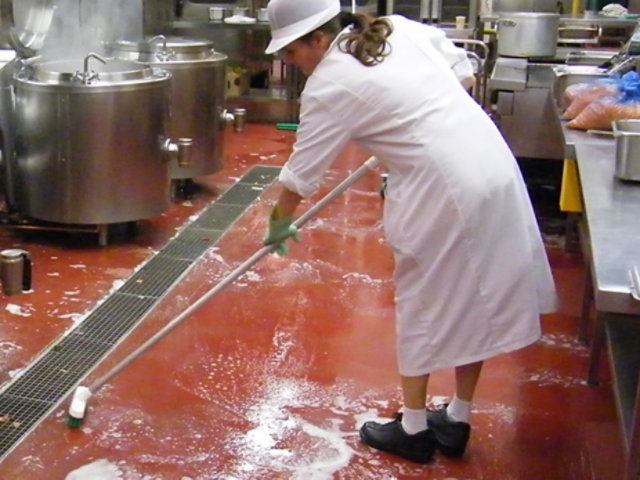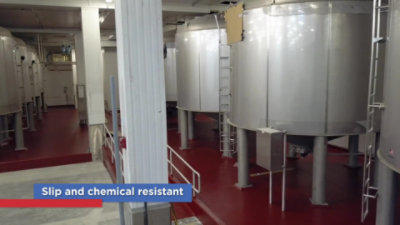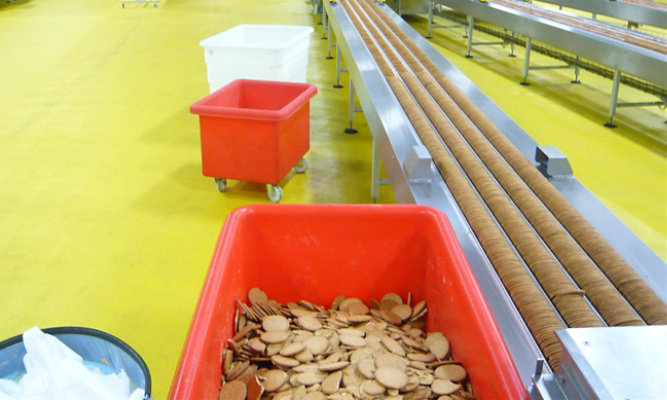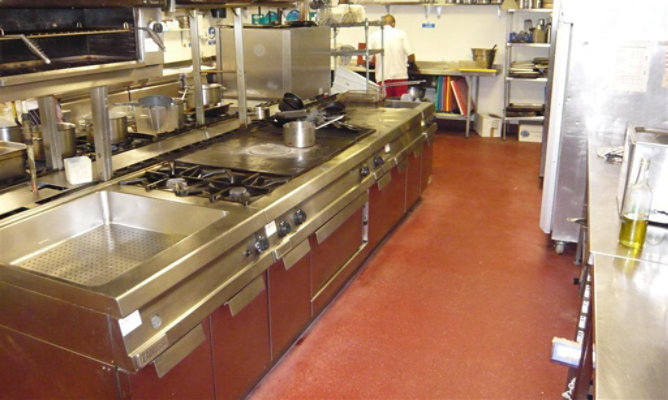
Can Resin Flooring Provide Permanent Anti-Slip Solutions
Are permanent anti-slip solutions possible for the food industry?
The flooring in industrial facilities needs to be suitable for the activities being carried out. In many industries, and in particular in the food and beverage plants, there is a regulatory requirement to provide a non-slip texture to prevent staff working there from slipping.
The anti-slip performance of a flooring system can be assessed by the pendulum Coefficient of Friction test (CoF), which was adopted in the UK some years ago by the Health and Safety Executive, as a reliable and robust test for slip assessment. This is also known as the TRRL Pendulum test. A reading with a value greater than 36, defined as having low-slip potential, is easier to achieve in dry conditions – but what a lot of facilities (such as food processing factories) require, is at least this value also under wet conditions.
What is the coefficient of friction?
Coefficient of friction is a measure of the degree of friction between two surfaces. Friction is the force exerted by a surface when an object moves over it – in this case, the staff walking across the floor. A low value indicates that the force required for slipping to occur is less than the force required when the coefficient of friction is high. Smooth floors can appear slippery when wet, however in practice, even though a low CoF result is obtained, specially designed resin floors can still provide non-slip resistance through their lifespan as they are subjected to wear because of aggregates within the matrix of a screed.
What properties of a floor coating affect the coefficient of friction?
A rough surface provides more points of contact and increases the coefficient, thus reducing the tendency for slipping. Roughness can be obtained by using resin flooring systems with a textured finish. This can be achieved in a number of ways, most of which involve incorporating an aggregate in the resin matrix. This could be done by a manual scattering of a various amounts of aggregate into the wet coating applied to the floor – or equally, by incorporating an aggregate into an actual resin formulation, such that it produces the desired texture on the surface when the system is installed.
However, what is often overlooked is how long these flooring systems will provide a texture which gives a reading exceeding 36 in wet conditions, when tested with the TRRL equipment. The hardness of aggregates vary, and the softer the aggregate, the sooner it will wear down with use. For example, polymer bead-type aggregates are not particularly strong, and when incorporated into a coating could wear down relatively quickly when subjected to heavy traffic. In practical terms – in a busy production unit, for example – this could mean a coating losing its texture and wearing smooth within a year after being laid, and the floor surface having a lower reading with the TRRL test. This could create a medium or even high slip potential, especially when the floor is wet.
Meeting customer expectations
When these anti-slip flooring systems are planned for use in food industry environments, customers have to be made aware of how durable a system is, and for how long it will provide good service. If a resin-textured coating system is sold and promoted responsibly, it cannot always be claimed as a long-term solution in a heavy-duty environment, when in reality it can only offer a solution for perhaps a year or two.
The longest-term solution from a resin flooring system in a busy heavy-duty food environment can only be provided with a screed-type product, typically with a minimum thickness of between 6mm and 9mm. These screeds are extremely durable and can be installed with a surface texture to provide a anti-slip finish with a large sized aggregate incorporated within the formulation. Polyurethane screed systems such as FasTop™ TG69 are a comprehensive solution for food industry environments and other industrial situations, as they can provide durability; chemical and thermal shock resistance; and low non-slip potential even in wet conditions. These systems are initially installed as a single colour finish, and there are eight standard colours to choose from in the Sherwin-Williams range.
It is a function of this product that the texture changes over time as the high spots are worn down with traffic. The polyurethane resin wears away on these high spots exposing the aggregate which appears as white speckles in the coloured finish of the floor, adding a degree of decoration within the finish. But more importantly for food factories with wet processes in operation, even though the floor becomes smoother, it starts to operate in a different way due to differences in texture, and still provides non-slip performance.
This has been demonstrated in environments such as fish markets and fish processing plants, where wet abrasion had worn down systems like FasTop TG69 to give a smooth finish, in contrast to the textured finish achieved when the system was first installed, while still providing good non-slip performance.
Case study - Hygienic cleanable anti-slip finish
A FasTop TG69 floor system was installed 10 years ago at Billingsgate Market in London, and had been constantly subjected to wet abrasion – the most aggressive type of abrasion. This floor was originally finished in standard forest green colour. Images of the floor taken after six years showed it to be more mid-green in colour with a white speckle. The floor was continuing to provide a safe walking surface with a hygienic, cleanable finish.
Another example of this non-slip performance was demonstrated at one of the UK’s biggest meat processing plants in the South of England where FasTop TG69 had been in use for over 10 years in a standard Sherwin-Williams grey colour. The high spots on this floor had worn down, and the floor had the white speckled finish as expected. The customer had a new area of floor finished with TG69 in the same colour as the original laid adjacent to the existing area installed over 10 years before. After being in use, the new area became wet and was subjected to spillages of fats and grease, and the factory found this area to be a little slippier than the older area. The solution in this instance was easy – the flooring contractor abraded sanded the FasTop TG69 to enhance the white speckled smoother finish rather than wait for this to occur over time through heavy traffic. This created a better non-slip solution for the factory. The floor cleaning process was also important in maintaining the anti-slip property. This project was a good example of how this polyurethane-type screed functions, and why it is a suitable all-round, long-term solution for demanding environments.
Discover More
Industry Expertise and Innovation
See how we help customers find customised solutions for their project and application challenges.
Product Lookup
Find out more about our innovative coatings for a variety of industries.
FIND A SYSTEM



